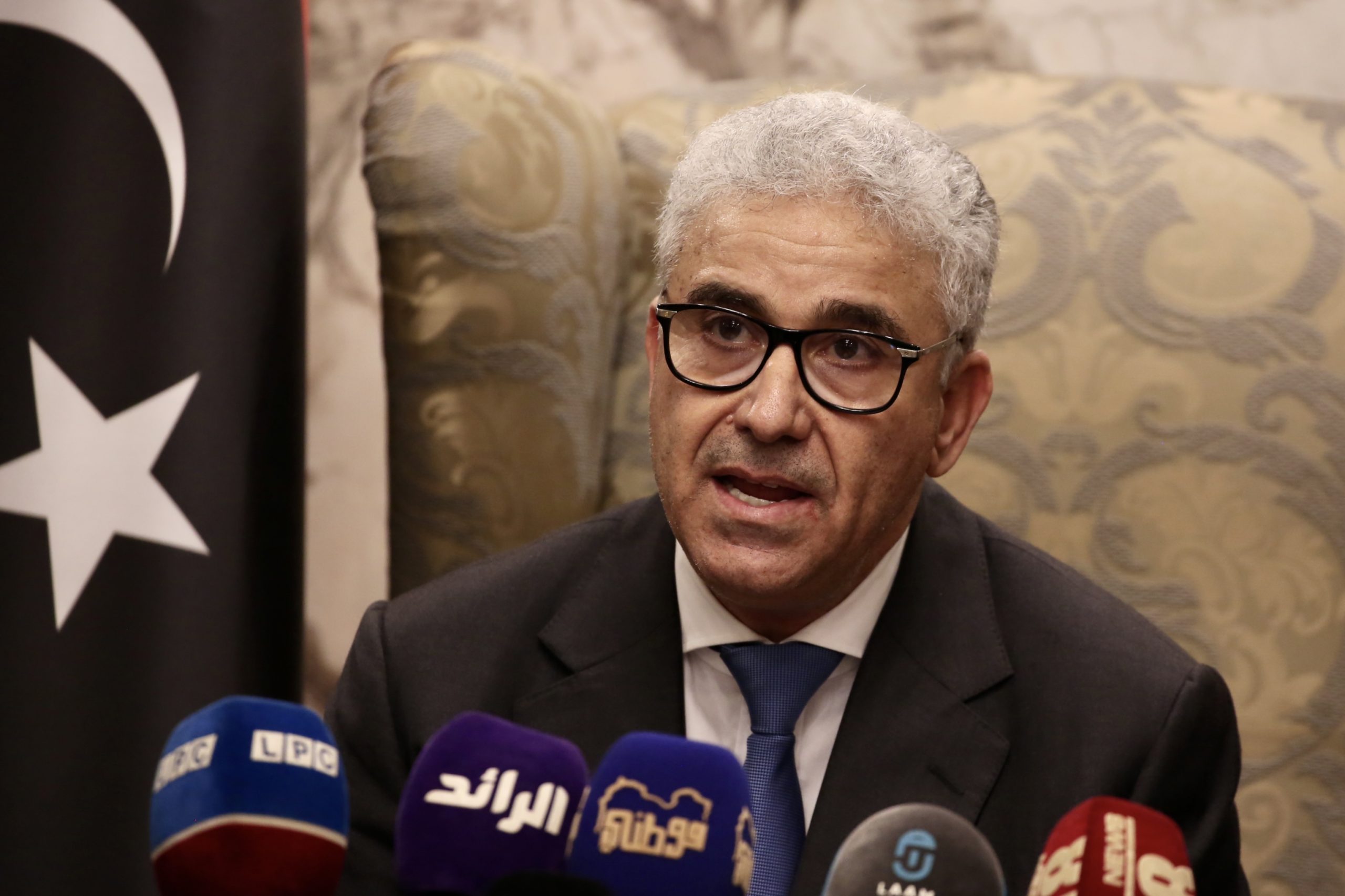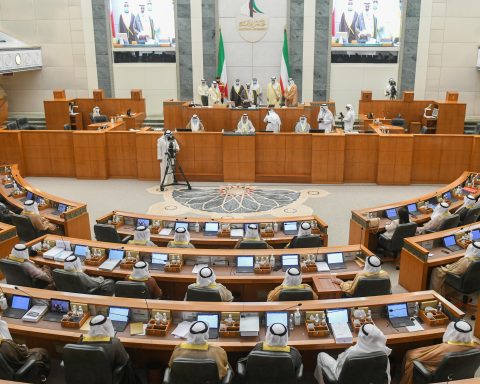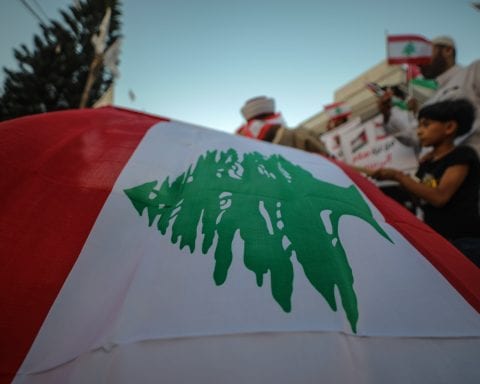Libya’s former interior minister, Fathi Bashagha, was tasked by the House of Representatives (HoR) in Tobruk to form a government. The announcement is merely the latest in an increasingly tense wrestling match between Libya’s interim Prime Minister Abdul Hamid Dbeibeh and his rivals who seek to oust him from power, or at least prevent him from benefiting from the political limbo brought about by the failure to hold elections.
Bashagha landed in Tripoli unopposed soon after the vote and held a press conference, highlighting the limits of Prime Minister Abdul Hamid Dbeibeh’s power and grip on Tripoli. Yet, more than a week later, Bashagha has been unable to physically remove Dbeibeh. Instead, reinforcements for Dbeibeh from Misrata have arrived in Tripoli in a bid to prevent Bashagha from actually taking power.
To understand these latest dynamics, it is important to understand why Bashagha has been named the prime minister-designate by the HoR, and why Bashagha accepted the vote.
The reality is that the Libyan factions are generally opposed to political dialogue. The preference over the last seven years has been to settle scores via violent conflict and skirmishes as the numerous militias across the country vie for power amidst an international scene that cares very little for the intricate dynamics of Libya’s politics. Washington, for example, has worked with various opposing factions, including the militias of Misrata and warlord Khalifa Haftar. Just as Washington backed Misrata’s ‘fight against terrorism’, Washington equally implicitly permitted Haftar to attempt to bring about a decisive military solution to the conflict as he bombarded Tripoli throughout the months of 2019. As it scrambles to rescue its declining influence in Africa, Paris has gone from being a firm ally of Qatar in 2011-12, to be a firm ally of its arch-rival, the UAE. Berlin has been an advocate for political settlements, but has been reluctant to enforce any agreements, including those that it has brought about through its diplomatic efforts.
The reason this is significant is that it emphasizes the reality of the current environment; dialogue is taking place only because the preferred military solutions are not currently viable. In other words, Turkey’s military intervention that rescued the Government of National Accord established a balance between the armed powers within Libya that ended the prospect of a military solution and thereby created an environment in which gains could only be made at the negotiating table.
It is only by understanding this dynamic that it becomes clear why elections have eluded Libya. Libya’s factions were forced to talk to each other and were dragged to the negotiating table by force. Therefore, they have exerted every effort to prevent any accord that might alter the power dynamics. Libya’s factions prefer a power-sharing arrangement that respects the individual power of each militia, or to wait for an opportunity to arise in which more military gains can be secured so as to improve their position at any superimposed negotiating table. This is not possible via elections in which Libyans are afforded the right to vote at the ballot box and given the opportunity to punish the competing militias.
Therefore, the failure to hold elections was the result of a collective effort on the part of the competing factions that each deployed their power and influence to prevent them from taking place.
With elections now put on hold, a new problem presents itself for Dbeibeh’s rivals. In 2015, the Skhirat Agreement stated that the interim prime minister would hold power for a year. Yet, then-prime minister Fayez al-Sarraj ended up in power for five years instead, as the mechanism for dialogue and the process for establishing a transition of power broke down.
Dbeibeh’s rivals believe a similar scenario is unfolding before them. The failure to hold elections, and the flat rejection of Libya’s factions to set a date or even discuss a viable framework conducive to facilitating an environment for elections, means that Dbeibeh could potentially remain in power indefinitely. Dbeibeh’s rivals, therefore, believe that he is in a prime position to consolidate his power and grip on the state institutions in a manner that is disadvantageous to the rest of them.
It is this awkward reality that has facilitated Bashagha’s appointment by the Tobruk-based parliament, led by Aguila Saleh. Bashagha, once an antagonist of Aguila Saleh and Khalifa Haftar, has become the lightning rod of attempts by Dbeibeh’s rivals to unseat him. Such is the perceived threat from Dbeibeh that there were suggestions of implicit support for Bashagha’s government even from the Head of the High Council of State, Khalid al-Mishri, who has publicly fallen out with him on a number of occasions, but al-Mishri has since clarified his position by coming out in favor of Dbeibeh.
For Haftar and Aguila Saleh, Bashagha’s appointment is an opportunity that costs nothing if it fails. Haftar is entrenched in the East. Aguila Saleh continues to be recognized internationally as the Head of the HoR. If Bashagha unseats Dbeibeh, then they will see their power increase. If Bashagha fails, then they lose none of the power and influence they already have. For Khalid al-Mishri, the prospect of a divided government between Bashagha, Haftar, Aguila Saleh, and the numerous militias in Tripoli means that no one is likely to be able to dominate in the manner Dbeibeh might if he remains in power. Without a major power, al-Mishri will be able to maintain relevance amidst a regional environment that has seen the allure of the Islamists’ nosedive in the eyes of public opinion.
Internationally, the matter is more complicated. Turkey does not have a particular affinity for any individual. Instead, Turkey prefers to support the recognized institutions that will respect the agreements that have been signed and that promise not to reverse any of the military gains that have been made via the involvement that rescued the political process. In this case, Turkey supports the prime minister, the government in Tripoli, and the political process. It is for this reason that Turkey has been able to be a firm ally of Tripoli and the main de facto power irrespective of who is actually in power. It is also for this reason that Ankara does not have an automatic aversion to Bashagha, who has good ties with Turkey generally. The problem for Turkey, however, is assessing to what extent Bashagha is capable of controlling the anti-Turkey elements among his backers, given that Tripoli is badly divided, and that Bashagha’s government is unlikely to be able to unite the Tripoli factions behind it. It is worth noting here that even during Haftar’s offensive on Tripoli, the militias were unable to unite into an effective unit to drive him out, and needed Turkey’s intervention to rescue them.
France, meanwhile, is keen to see Dbeibeh ousted on the basis that Bashagha’s most powerful backers are allies of Paris. For Paris, Bashagha is likely to be more amenable to containing Turkey’s growing influence than Dbeibeh is. Bashagha is also less likely to be as reliant on Ankara as he enjoys increasing support from Cairo and, tentatively, from Abu Dhabi.
Washington is generally apathetic to Libya’s political actors and is more concerned with finding a viable political solution that contains Russia, pushes it back and ends the instability. It is in this spirit that Washington has displayed a consistent capacity for pragmatism that encourages Libya’s factions to resist any attempt to impose elections. For Libya’s factions, Washington will recognize the ‘winner’, irrespective of how the ‘winner’ wins. If Bashagha can convince enough of Tripoli’s militias to support him, and if he can physically remove Dbeibeh, the expectation is that Washington will recognize his government.
Yet, it is not clear if Bashagha even has the power to impose himself. After consideration, Ankara has declared that it will continue to support Dbeibeh. As the de facto military power on the ground, this is a body blow to any attempt by Bashagha to impose himself. Moreover, UN envoy Stephanie Williams has been shuttling relentlessly to rescue the political process. The renewed vigor of her efforts has the potential to embarrass Libya’s factions internationally and rally international powers into a position more conducive to creating a new political accord.
The danger, however, is what happens if Bashagha fails. Does the HoR decide to recognize him anyway and establish a government in the East? If so, does this set Libya officially down the road towards partition, particularly given a military campaign from either side appears unviable? A government in the east could potentially secure international buy-in from France, Russia, Egypt, and the UAE. Much of the oil resources are also in the East. Partition also appears to be a common conflict resolution measure, as seen in Republika Srpska in Bosnia, the Kurdish Regional Government in Iraq, and elsewhere, where new autonomous federations are set up when the international community tires of trying to reconcile seemingly irreconcilable differences.
These are important questions that suggest Libya is increasingly approaching a crossroads. Yet, diplomatic efforts continue. Turkey has opened channels with Aguila Saleh, Cairo, and Abu Dhabi. Such initiatives could lead to some sort of accord that might facilitate a compromise in which a government reshuffle is conducted that is acceptable in principle to the competing centers of power. Although this is not an ideal solution, it may well fend off the two worst-case scenarios: war and partition.
However, it may well turn out to be the case that Bashagha’s failure to impose himself in Tripoli will see Aguila Saleh and Haftar simply withdraw their support and cast him aside in a manner that condemns Bashagha to irrelevance.














